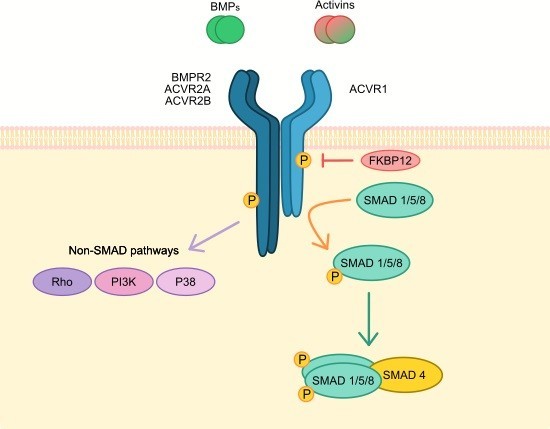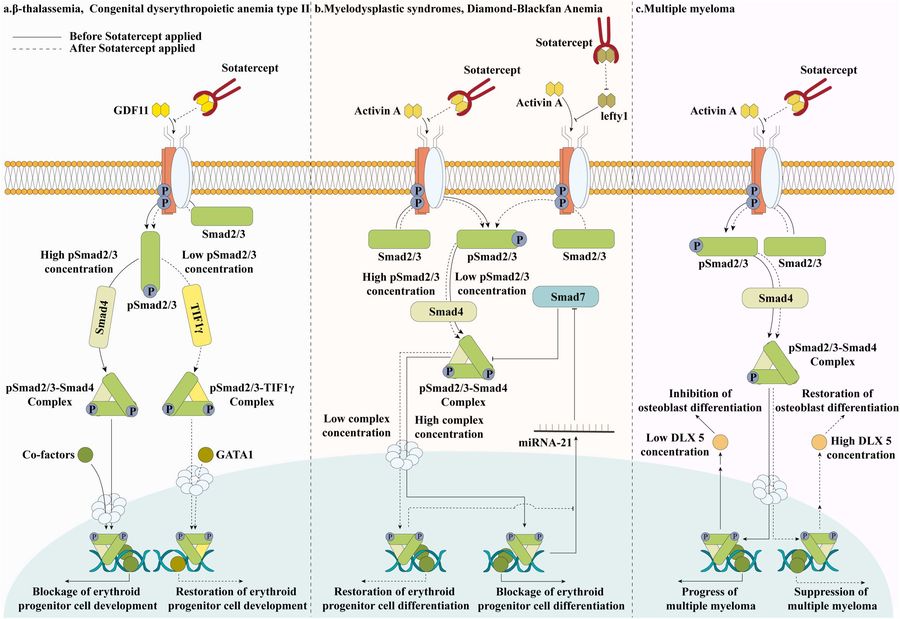| Catalog# | Product Name | Size | Price | Qty | Inquiry |
|---|---|---|---|---|---|
| THP-0319 |
Sotatercept

|
10ug | $298.00 |
|
Add to Cart Order |
| 100ug | $1,598.00 |
|
Add to Cart Order | ||
| 1mg | $3,998.00 |
|
Add to Cart Order | ||
Activin receptor type 2A (ACVR2A) is a transmembrane serine/threonine kinase receptor of the transforming growth factor-beta (TGF-β) superfamily that mediates essential biological processes such as cellular proliferation, differentiation and inflammation. Upon ligand binding, ACVR2A forms a complex with type 1 receptors to phosphorylate downstream SMAD proteins, thereby initiating gene transcription. Dysregulated ACVR2A signaling contributes to pathological conditions, including excessive tissue remodeling, inflammation, and abnormal cell proliferation. As a result, ACVR2A has emerged as a promising drug target. Emerging therapeutic strategies focus on modulating ACVR2A activity to treat diseases such as anemia and osteoporosis, with sotatercept showing significant clinical potential.
NCBI Gene ID: 92
UniProtKB ID: P27037
ACVR2A serves as a key regulator of cell growth, tissue homeostasis and inflammation by transducing signals from activins and related ligands. It modulates hematopoiesis by influencing erythroid progenitor maturation and plays a critical role in maintaining skeletal integrity by balancing bone formation and resorption. In addition, ACVR2A signaling regulates immune responses and wound healing, underscoring its broad physiological relevance. Dysregulation of ACVR2A signaling is associated with anemia in chronic disease, reduced bone density, fibrosis and tumor progression, highlighting its potential as a therapeutic target.
 Figure 1. ACVR1 Signaling.
(Valer et al., 2019)
Figure 1. ACVR1 Signaling.
(Valer et al., 2019)
Ligand traps are engineered proteins designed to sequester specific ligands, preventing their interaction with ACVR2A. Sotatercept is a fusion protein consisting of the extracellular domain of ACVR2A linked to the Fc portion of human IgG1. Sotatercept acts as a decoy receptor, binding to activins and GDFs, thereby restoring normal signaling in conditions of overactivation. This therapeutic strategy has shown promise in diseases characterized by dysregulated ACVR2A signaling.
Monoclonal antibodies targeting ACVR2A or its ligands represent another therapeutic approach. These antibodies block receptor-ligand interactions or inhibit receptor activation, reducing pathological signaling. While research in this area is ongoing, early studies suggest their potential in addressing fibrotic and inflammatory diseases.
Sotatercept has emerged as a leading candidate for targeting ACVR2A-mediated pathways. By binding to activins and GDFs, sotatercept attenuates excessive activin signaling and restores normal tissue function.
Sotatercept targets not only activin receptor type 2A (ACVR2A), but also other components of the TGF-β signaling pathway such as activin receptor type 1B (ACVR1B) and growth/differentiation factor 8 (GDF-8).
 Figure 2. Sotatercept's
mechanism of action in hematological disorders. This illustration demystifies the molecular actors in sotatercept's mode of action within blood-related
diseases. (Lan et al., 2023)
Figure 2. Sotatercept's
mechanism of action in hematological disorders. This illustration demystifies the molecular actors in sotatercept's mode of action within blood-related
diseases. (Lan et al., 2023)
While targeting ACVR2A with therapies such as sotatercept has shown great promise, challenges remain. The redundancy of ligands and receptors in the TGF-β superfamily complicates efforts to achieve receptor specificity. In addition, long-term modulation of ACVR2A signaling may result in off-target effects or unintended consequences on immune function and tissue homeostasis. Further research is needed to optimize the safety and efficacy of ACVR2A-targeted therapies, particularly in the setting of chronic disease.
Creative BioMart offers sotatercept targeting to ACVR2A, inquiry now or contact us for more details!
References
For more information on how our products could help advance your project, please contact us.
ENTER YOUR EMAIL HERE TO SUBSCRIBE.
Copyright © 2026 Creative BioMart. All Rights Reserved.